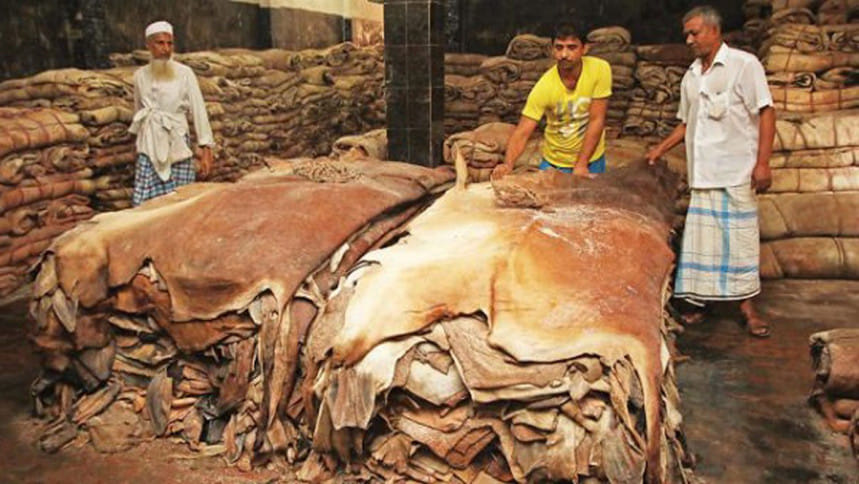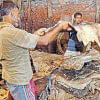Rawhide traders upbeat as tanners pay arrears

Rawhide traders are expecting a good season for business this year as tanners have cleared last year's arrears owed to them, which would in turn enable purchasing skins and hides from seasonal traders during upcoming Eid-ul-Azha.
The rawhide traders across the country have already received arrears amounting to nearly Tk 650 crore of last year from the tanners, said Aftab Khan, president of the Bangladesh Hide and Skin Merchants' Association.
So, this year rawhide merchants will face no cash crunch, which was acute over the last couple of years. If favourable weather prevails, there will be no problem in selling rawhides this year, he said.
Rawhide merchants are a very important part of the whole supply chain of the business.
Tanners usually clear some of previous years' arrears before Eid-ul-Azha so that rawhide merchants can buy skins and hides from seasonal traders who collect those from individuals.
Khan said rawhide merchants have been demanding clearing all arrears of 2015 and 2016. This year tanners could not clear arrears of those two years due to low sale of their previous stocks of tanned hides, he said.
The dues accumulating in those two years marked the beginning of a downturn in the rawhide business as rawhide merchants at that time could not buy as much hides and skins from seasonal traders as they would have liked.
The slump in business has continued till date.
Khan also said prior to the payments made this year, the arrears of 2015 and 2016 amounted to Tk 110 crore. Now less than Tk 100 crore was due as tanners have already made some payments, he said.
It is expected that tanners will gradually clear all arrears so that rawhide merchants can properly maintain their business, said Khan.
The Ministry of Fisheries and Livestock estimates that some 1.2 crore animals could end up being sacrificed this year, two lakh more from that last year.
Khan recommended proper application of salt at the collection stage, saying it would help preserve rawhides for at least two months.
The commerce ministry also suggested the same and to sell the skins when prices go up in the markets.
The government has directed not to bring any rawhide from around the country to Dhaka and Savar Tannery Industrial Estate (STIE) for one week from Eid day.
It has also allowed 14 companies to export 60 lakh square feet of rawhide this year. The export had been banned for some 30 years or so.
Shahin Ahmed, president of Bangladesh Tanners Association, is also hopeful of securing good business this year as the rawhide merchants have already been paid. "Our preparation is also good so far," he said.
Tanners could avail Tk 170 crore from four banks this year against their demand for Tk 600 crore, he said.
He also complained that the STIE was yet to be fully functional even though a huge amount of money and time had been spent behind it.
The STIE has no chrome recovery and solid waste management facilities, for whichtanners fail to meet international regulations and to secure better prices from international retailers and brands, he said.
Furthermore, the local environment is also being damaged, he said.
Local tanners have to sell tanned hides and skins at a price 40 per cent below the international rate for this non-compliance and for not having a much-needed Labour Working Group certification.
The central effluent treatment plant (CETP) of the STIE has a capacity to treat 25,000 cubic metres of wastewater per day. But during Eid-ul-Azha, 42,000-45,000 cubic metres ends up being generated each day.
To cope with the additional pressure during Eid, the estate authorities have divided the 134 tanneries that are up and running into groups and allotted them time slots for discharging wastewater.
"We have initiated a system so that the capacity of the CETP can be properly used," said Mustak Ahmed, managing director of the STIE and a deputy secretary to the industries ministry.


 For all latest news, follow The Daily Star's Google News channel.
For all latest news, follow The Daily Star's Google News channel. 








Comments